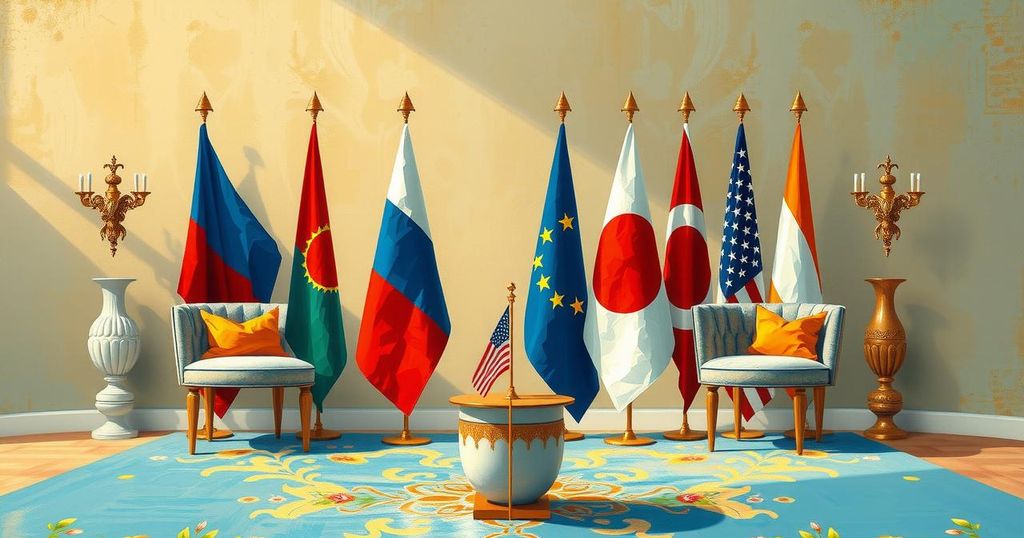Dmitry Polyanskiy criticized the Biden administration’s actions in the Ukraine conflict, blaming them for escalation. He praised the Trump administration’s approach as more realistic and welcomed Saudi Arabia’s emerging role in global diplomacy. Polyanskiy emphasized challenges in influencing Israeli policy regarding Gaza and supported Arab unity in seeking resolutions. Additionally, he expressed Russia’s backing for Sudanese authorities against internal conflicts and discussed long-standing ties with Syria, advocating peace and transitional support there.
In a recent interview on the Arab News program “Frankly Speaking,” Dmitry Polyanskiy, the first deputy permanent representative of Russia to the UN, criticized the Biden administration for exacerbating the conflict in Ukraine. He argued that U.S. actions had fueled tensions and led to Russia’s military intervention in February 2022, claiming that it served as a catalyst for the ongoing crisis.
Polyanskiy expressed that the previous U.S. administration was less constructive, labeling it as part of the problem rather than a solution. He indicated that a shift in perspective and approach could have mitigated the situation years ago. He attributed the escalation of the conflict to a series of decisions aimed at provoking Russia, resulting in negative consequences for Ukraine.
As the discussions in Riyadh unfolded, Polyanskiy praised the previous Trump administration’s realism and willingness to recognize the actual conditions of the battlefield. He stated that Trump’s proposals included realistic solutions aimed at ceasing hostilities, in stark contrast to the Biden administration’s stance. To him, the current U.S. approach lacked recognition of the prevailing dynamics in Ukraine.
Recent diplomatic talks in Riyadh have positioned Saudi Arabia as an increasing player on the global stage. Polyanskiy lauded Saudi efforts to mediate discussions between the U.S., Ukraine, and Russia, recognizing the kingdom’s supportive posture. He remarked on the emergence of new diplomatic centers as traditional ones like Geneva lose credibility due to perceived biases.
On broader issues, including the Gaza conflict, Polyanskiy acknowledged Russia’s limitations in influencing Israeli policies as compared to the U.S. He emphasized the importance of Arab mobilization and unity in addressing the Palestinian plight and reiterated Russia’s consistent advocacy for a two-state solution.
Polyanskiy criticized past normalization attempts between Israel and Arab nations that overlooked the Palestinian issue as misguided. He expressed uncertainty regarding the future U.S. policy in the Middle East while acknowledging the significant mobilization efforts of Arab nations for a just resolution.
Addressing the humanitarian crisis in Sudan, Polyanskiy stated Russia’s support for the Sudanese government against the Rapid Support Forces amid ongoing conflicts. He conveyed optimism for stability in the region while dismissing foreign interventions as potentially detrimental to Sudan’s sovereignty.
In discussing Syria, Polyanskiy reflected on Russia’s historical ties and continued support for a transitional authority aimed at fostering peace and combating terrorism. He reiterated Russia’s commitment to aiding Syria during its transitional phase while fostering bilateral relations made strong by decades of friendship.
Dmitry Polyanskiy’s remarks underscore Russia’s criticism of U.S. foreign policy, particularly under the Biden administration, while advocating for renewed diplomatic engagement and support for resolution efforts both in Ukraine and other global conflicts. He positions Saudi Arabia as a pivotal player in international diplomacy, particularly in light of recent talks. Furthermore, he emphasizes Russia’s commitment to supporting governments in crises but cautions against the influence of foreign interventions, urging collective Arab action toward regional stability and the Palestinian cause.
Original Source: www.arabnews.jp






